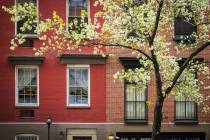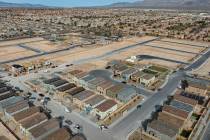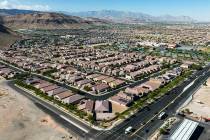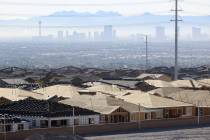Experts say it’s plain: Housing pain to remain
Las Vegas, once the darling of the nation's housing boom, is feeling unloved for the holidays.
Median home prices have dropped 30 percent in the past year, foreclosures have doubled and the inventory of homes for sale in the valley is hovering around 23,000, slightly below its all-time high.
It's been a precipitous fall from 2004, when Las Vegas home values appreciated 40 percent and 50 percent in consecutive quarters and buyers were qualifying for mortgages with little or no documentation of creditworthiness.
Too many people bought too much home with too much credit. Some called it "creative financing."
Foreclosures now account for 60 percent to 70 percent of monthly home sales in Las Vegas and their median price is $166,000, which is below replacement cost in most cases, housing analyst Larry Murphy of Las Vegas-based SalesTraq said.
New-home construction has fallen to its lowest level in 30 years. Fewer than 6,000 new residential building permits will be pulled this year, less than half of last year's total.
With an estimated 15,000 real estate-owned properties held by banks, the picture won't get any prettier in the coming year, Murphy said.
Most analysts agree it will get worse before it gets better.
"We're still trying to get this patient stabilized, not up and running a marathon," Murphy said. "I think we're getting to that point where conditions will stop getting worse. They're just going to stay bad."
Real estate consultant John Burns said the U.S. economy is in the early stages of a downward spiral. It will take significant government intervention to avoid double-digit unemployment rates.
"In our opinion, the root of the problem is falling home prices, which is leading to massive bank and investment losses, which is shutting down capital flow, which leads to job losses, which leads to more foreclosures and thus falling home prices," Burns said.
"Foreclosures are the whole key to the housing situation right now and that will continue through 2009," Dennis Smith of Home Builders Research added. "There's no magic switch to click it off."
Although new-home sales in Las Vegas have declined 46 percent to 9,134 through October, the resale segment is regaining strength with more than 3,000 closings in four straight months, Home Builders Research reported.
Some of that demand will eventually find its way to the new-home segment, said Jeff Canarelli, vice president of sales for Las Vegas-based American West Homes.
"This is obviously based on the assumption that the rate of foreclosures will decrease at some point," he said. "Foreclosures are making the largest impact on housing in terms of both alternative competition for buyers and diminished value from appraisers."
American West has whittled the price of a new home to $99 a square foot at its Newcastle at Highlands Ranch subdivision in the southern Las Vegas Valley. Canarelli said he hasn't seen those prices since 2004. He sold 12 homes in the first two weeks of the grand opening in October.
The home builder has worked diligently with its subcontractors to reduce construction costs and price new homes competitively with resales and foreclosures, Canarelli said.
"This has to be the floor for the price of a new home," he said. "We are fairly certain the costs are at the bottom."
New-home sales peaked at nearly 1.3 million units nationally in 2005 as consumers "stole demand from the future," Tim Sullivan of Sullivan Group Real Estate Advisors said. Now they're giving it back.
With the "overhang" of new-home supply, Sullivan expects sales to fall to 1981 levels.
Daily news about financial institutions crumbling and economic uncertainty has dragged U.S. consumer confidence to 40-year lows. Steady employment is the cornerstone of consumer confidence, Sullivan said, and that's what will drive spending.
"Economists will tell you consumer confidence is the hardest indicator to model. It's emotional. Other (economic) indicators are based on data," Sullivan said.
Most of the events in the past 12 months have been unprecedented, as were market conditions between 2004 and 2007, research analyst Jeremy Aguero of Las Vegas-based Applied Analysis said.
Historically low interest rates combined with skyrocketing home prices fueled record home equity extraction, which pushed the local and national economies to new highs, Aguero said.
Although the negative effects of the financial crisis and beaten-down consumer confidence cannot be ignored, Aguero said, it would be a mistake to dismiss the potential impact of the government's $700 billion bailout package and the Housing and Economic Recovery Act, which provides $70 million to buy foreclosed properties in Nevada.
"This is the time for patience and prudence, not panic," he said. "We expect to start seeing measurable impacts of these actions by the close of 2008."
The market will bottom out when the number of bank-owned properties sold exceeds the number going into foreclosure, SalesTraq's Murphy said. He counted 2,454 foreclosures in October, while bank-owned sales came to about 86 percent of that total.
We won't know we've reached bottom until we're past it and prices start to rise, broker Tim Kelly Kiernan of ReMax Brodkin Group said. With more than 200 notices of defaults going out every day, foreclosures will continue to plague the market.
Kiernan suggests there are some 10,000 real estate-owned, or bank-owned, properties waiting to hit the market in Las Vegas. He's advising clients not to sell unless they absolutely must and they're willing to bring money to the table upon closing.
Buyers have to make strong offers on REOs and short sales. They won't be able to "low-ball" the banks, Kiernan said.
"In general, this is a unique real estate market here in Las Vegas, to say the least," the REO specialist said. "The rules have changed dramatically, and it depends on which side of the fence you're on. We may never see this type of market again. In most areas, prices are back to 2002 and 2003."
Kelly Maguire, president of BDG Enterprises and a former mortgage company executive, believes Las Vegas became "patient zero" for the subprime mortgage crisis.
It was the first domino to fall and had "deleterious effects" on a number of large companies, many of which failed subsequent to the initial collapse in Las Vegas, he noted.
"Looking back, I'm close to being confident that the start of this was right here in our own backyard," Maguire said. "When you look at the real estate bubble and the overinflated, excessive behavior that may prove the driving force behind the overarching crisis, what better market to use as a glittering jewel of failed discipline?"
The subprime mortgage crisis has eased with the tightening of credit requirements, said Chris Biaggi, president of All Western Mortgage in Las Vegas. Although he's still financing people, dealing with the challenges has gotten tougher, he said.
"What we're seeing is first-time home buyers are back," Biaggi said. "Prices have dropped to a level that's affordable for just about anybody. And investors are back. Those are the two. There's not a lot of move-ups."
Federal Housing Administration is still the financing of choice, he said.
The goal of home ownership -- the "cornerstone of America" -- got us into this mess and it will lead us out, Jack Haynes of Countrywide Home Loans said. Demand will come from all demographic segments, including baby boomers, echo boomers, Generation X and Hispanics.
In "Wealth of Nations," published in 1776, Scottish economist Adam Smith talks about the "invisible hand," Haynes said.
"That's the government," he said. "So we've got to be mindful that the process is long and protracted. This is a deliberate process and a process that's going to take time. We're going to have to be patient, but the alternative is what?"
Canarelli said he hopes the bailout is used to help potential buyers gain access to housing through interest rate buy-downs and down-payment assistance in the form of a true tax rebate.
"The bailout is going to work for someone," he said. "If the money is used to help banks and note holders become whole on bad loans, the most benefit will go to the banks and those buyers who overextended themselves."
Buyers still prefer new homes and the advantages that come with buying new homes over existing homes, Canarelli said. They want neighborhoods with nice schools and parks and streets that are well maintained. It's just a matter of affording the home they want, he said.
Housing starts could take any number of paths over the next several years, the Congressional Budget Office reported in November.
The optimistic scenario is based on the possibility that much of the rise in vacant units for rent from 2000 to 2004 -- some 700,000 units -- stemmed from a permanent upward shift in the underlying vacancy rate to above 1990 levels.
Under this scenario, housing starts are already at their trough. Activity begins to rebound late this year to about 980,000 housing starts. It grows to 1.27 million starts in 2009 and 1.72 million in 2010.
The cyclical downturn scenario starts from the estimate that 1.3 million excess vacant units at the end of the second quarter would not be eliminated by the current low levels of new construction or by fewer mobile-home shipments.
Housing starts would remain below recent levels at 940,000 in 2008 and 810,000 in 2009, finally recovering to 1.23 million in 2010.
In the pessimistic scenario, the 1.1 million vacant units resulting from above-normal growth since 1996 are excess vacancies, bringing the number of vacant units to 2.4 million. Adverse cyclical and financial conditions reduce household formation by 700,000 more units.
Housing starts would continue to decline, from 930,000 in 2008 to 600,000 in 2009 and 620,000 in 2010.
"The rebound in construction would be slow, held back by the huge overhang of vacant units and weak household formation," the Congressional Budget Office report said.
Despite the biggest declines in housing prices since the Great Depression, long-term homeowners who mortgaged rationally should retain significant value gains from many years of steady appreciation, Jonathan Miller wrote in a report for the Washington, D.C.-based Urban Land Institute.
"In previous generations, people bought homes to live in and didn't look at them as wealth generators," he said. "That changed recently and people overreached. Home buying was oversold as a path to financial freedom."
Despite government bailouts and stock market volatility, homeowners remain somewhat optimistic about the housing market, a survey by Zillow.com, an online real estate agency, found.
Nearly half (49 percent) of U.S. homeowners believe their home is insulated from the nation's price declines. They think their home values have increased or stayed the same over the past year.
Zillow reported that 74 percent of homes have lost value during that time.
"After one of the most turbulent quarters in history for the U.S. economy and housing market, you'd expect the reality of dropping home values to start sinking in," Zillow Vice President Stan Humphries said.
"We're seeing a fascinating distinction in consumer psychology," he said. "On the one hand, homeowners appear to understand the reality of today's economy and are curbing their household spending, but on the other hand, they still aren't ready to admit that these woes might extend to their own homes. There's clearly still some denial."
Contact reporter Hubble Smith at hsmith@reviewjournal.com or 702-383-0491.























